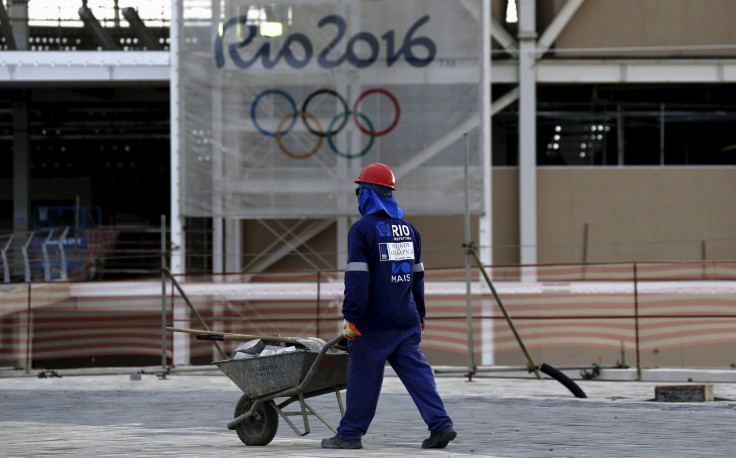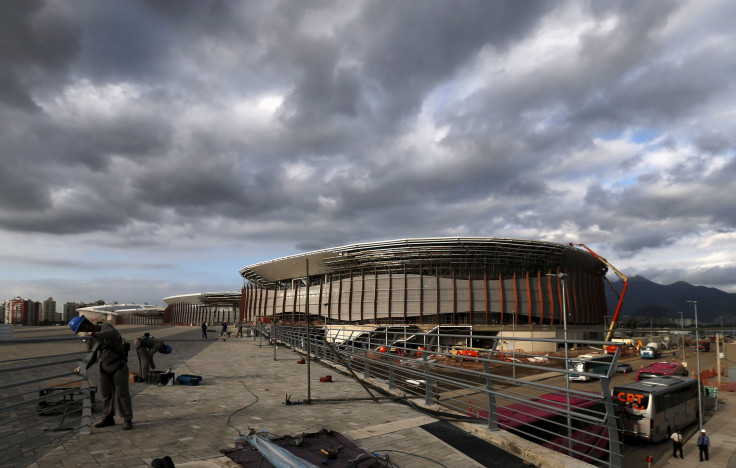Rio Olympics 2016: Brazil Recession Threatens Summer Games Amid Budget Cuts, Political Scandal

A wall of sound slowly built on the streets of Rio de Janeiro on Oct. 2, 2009, as then-president of the International Olympic Committee Jacques Rogge fiddled to slip open an envelope. When Rogges finally read the contents of the package, announcing to an eager world that Rio would host the 2016 Summer Olympics, the wall of sound burst outward, muffling the television broadcast.
Those were different times. Brazil was flush, the economy booming. Now, the country is knee-deep in a recession, less than one-year out from the 2016 games. The games' organizing committee said Tuesday they would slash away at the operating budget by at least 10 percent in order to stay within a projection set at about $1.9 billion.
“The days of lavish spending are over,” Mario Andrada, Rio 2016 communications director, told the BBC.
With a recession in full swing, and no end in sight, the 2016 games could continue to see complications. While Brazil has bigger problems to face, the reach of an economic downturn touches every corner of country, and the games are no exception. Mega-events have a persistent habit of overrunning cost projections, and in Brazil's economic climate, that could spell trouble for organizers scrambling to put together a successful games. Likely to cost in excess of $10 billion, the already troubled 2016 Olympics face an uncertain future. As the Aug. 5, 2016, start date inches ever-closer, organizers will battle between keeping costs reasonable during a recession against the expectation of putting on a sporting spectacle for the world.
'Brazil Nausea'
Brazil, the world’s seventh largest economy, is mired in a crippling recession projected to last through 2016. The economy is expected to contract by around 2.7 percent in 2015 with inflation rising to about 9.5 percent. Unemployment has grown at a rampant pace. It was at a record low of 4.3 percent in December but had risen all the way to 8.6 percent in July.
When Rio won the games in 2009, Brazil was a power that excited economic players throughout the world. Marcos Troyjo, an economist who heads up the BRICLab at Columbia University, which studies the economies and political affairs of the four so-called BRIC nations of Brazil, Russia, India and China, in New York City, called those times "Brazil Mania," the world embracing the country. He has a new phrase for the current state.
"It turns out that next year’s Olympics will take place at the very bottom of what I call 'Brazil Nausea,'" Troyjo said in a phone call from Rio. "This is the backdrop."
Brazil, currently in political gridlock, has looked at taking strong austerity measures aimed at cutting spending in a range of areas including health programs, government salaries and infrastructure investments.
Brazilian President Dilma Rouseff meanwhile, in the midst of the downturn, has seen her approval ratings languish, dropping into the single digits in the summer and just barely returning to 10 percent in September. Rouseff is also embroiled in a scandal alleging political corruption, with her opponents threatening an impeachment that would throw the government into complete disarray.
Parts of Rio are expanding, some urban areas revitalizing, but the overarching scene in Brazil is painted over by a persistent recession. "Brazil has been in a recession since the third quarter of 2014," Troyjo said. "Nobody expects economic growth to resume in 2016."
Tempered Expectations
Some of the Rio Olympics funding, although exactly how much is unclear, is privatized, a factor that should help ease spending concerns. But any operational cost overrun would fall on the government to pay, as well.
Although total projected spending for the 2016 games has fluctuated, about 75-85 percent of it would likely come from public funds, said Andrew Zimbalist, professor of economics at Smith College in Northampton, Massachusetts, and author of the book "Circus Maximus: The Economic Gamble Behind Hosting the Olympics and World Cup.”
Traditionally, as games draw closer and projects remain unfinished, money gets spent at a breakneck pace. John Coates, International Olympic Committee vice president, aroused particular concern when he said Rio’s preparations were the “worst ever” last year. As the race to finish construction projects continues, the 2016 games will likely see cuts on easy-to-slash items.

"I think that one of the things that’s going to happen here is you're going to find a lot of compromises ... You'll see less money being spent on opening ceremonies, You'll see more reliance on volunteers," Zimbalist said.
The operational budget cuts already announced include scrapping a plan to add a new level to a stadium and using temporary housing for officials and athlete family members. Some areas of funding could see as much as a 30 percent reduction in budget.
'It Doesn't Help'
All things considered, Brazil has larger issues aside from the Olympics. But the 2016 games are following a common path for these types of events: excitement first, belt-tightening second and last-second spending third. If something is left unfinished, attendees hardly notice under the excitement of the actual athletic events in the Olympics.
Considering the recession, the idea of spending is further complicated. "It doesn’t help," said Stefan Szymanski, a professor of sports management and economics at the University of Michigan, about the recession. At the same time, the games cost about one-tenth of 1 percent of Brazil's total economy.
"On an economic scale they are a statistical rounding error," Szymanski said.
Games have gone through during a recession before. Beijing, to rave reviews, hosted in 2008 during the global recession. Athens, Greece hosted the games in 2004 under shaky economic conditions, and costs skyrocketed because of last-minute prep. It's been suggested that the games helped cause Greece's ensuing economic meltdown, something the country is still grappling with today.
"I don’t think it helped the Greek economy in any way… my expectation would be there's a slight effect," Szymanski said.
But Szymanski doubts the Olympics ever have a real effect, in one direction or the other, on a country's economy. Brazil will host the games and those who attend will likely enjoy their experience. Many were skeptical the country was prepared the 2014 World Cup. Yet the global soccer tournament took place.
The 2016 Olympics in Rio are expected to scramble to the finish line, but the games -- if a tempered version of the original plans -- are also likely to start in August to raucous cheers. But unlike the October 2009 bid-winning day, those cheers might not come from Brazilians.
More than half the tickets allocated for citizens of the host country remain unsold. In a time when jobs are scarce and budgets shrunk, the Olympics might just be a luxury Brazilians can ill-afford.
© Copyright IBTimes 2024. All rights reserved.






















